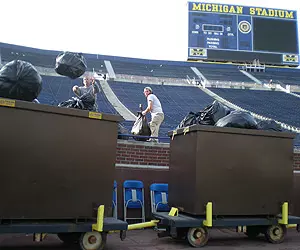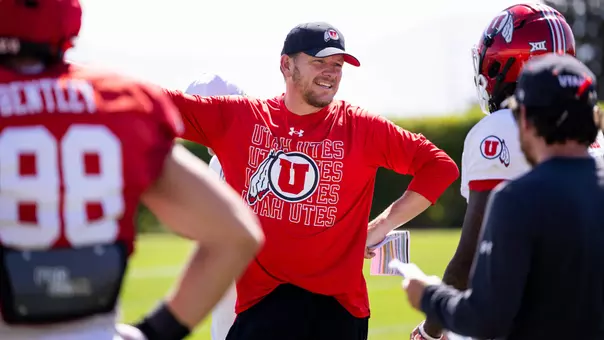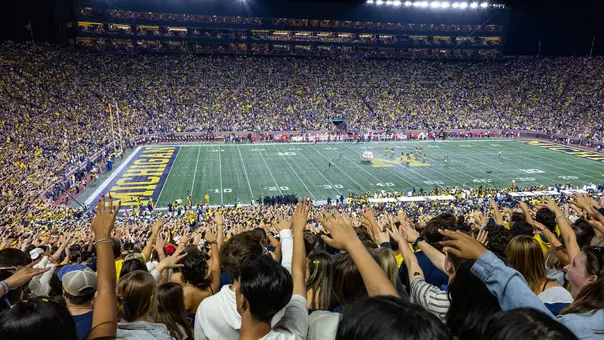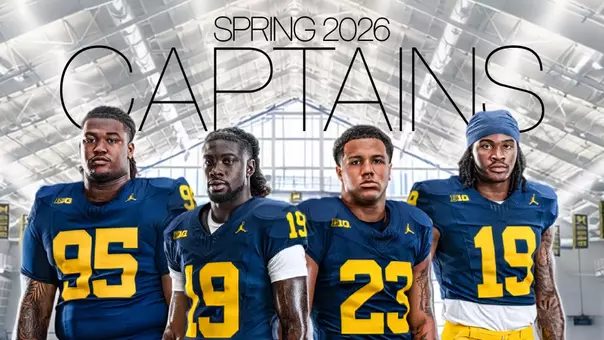
How They Clean the Big House
10/6/2008 12:00:00 AM | Football
Slideshow
At 6:30 a.m. on Sunday mornings, I'm usually in bed fast asleep, dreaming about race cars and thunder lizards. On the Sunday after Michigan's historic comeback victory over Wisconsin, I was drinking coffee in my kitchen and trying not to trip over the cat as I got ready to clean the Big House.
The cleaning of the Big House begins during the game and finishes sometime around noon on Sunday. Crews clean the concourse, collect recyclables and empty trash cans while the game is going on, but the bulk of the clean-up is reserved for Sundays. Up to 350 families from Father Gabriel Richard High School, along with a professional crew of cleaners, descend on Michigan Stadium each Sunday morning after home games to undo the mess made by nearly 110,000 fans. Additionally, Boy Scout Troop 111 takes care of trash in the parking lots and around the outside of the stadium fence, making sure that everything is clean and tidy for Monday.
The sun was peeking over the horizon when I pulled in to the parking lot next to the Michigan Stadium tunnel with the temperature at 57 degrees. It was a quiet dawn except for the cries of hundreds of seagulls circling the stadium and the distant beep-beep-beep of trash trucks reversing. A handful of workers were already picking up trash and bottles in the parking lot with a few more walking down the tunnel and onto the field to make the first dents in the debris. My first sign of clean-up is a septic truck parked at the end of the Michigan Stadium tunnel, emptying the portable toilets that people on the field use throughout the game.
U-M's recycling crew arrives around 7 a.m. to separate water bottles and recyclable materials from the regular trash, filling large containers to the brim with bottles and cardboard. On the field with her "mechanical picker", which is the trade name for a trigger-activated grabby thing, Elin Edwald picks up hundreds of water bottles that are strewn all over the edge of the field. A first-year PH. D. student in chemical biology, Elin moved to Michigan from Iceland to continue her academic career. Needing a part-time job, she signed on to clean the Big House on Saturdays and Sundays.
"This is my second Sunday and yesterday was my third Saturday," said Elin. "During the game, we stand at the gates and encourage people to recycle. We also rescue recyclables from the garbage because a lot of people throw them away."
With five co-workers, Elin is on the front line of the Michigan Stadium clean-up crew, working the field and the concourse. Maybe it's the monotony of the job or the early hour, but Elin is very philosophical about her duty.
"I got here before dawn and saw the sun rise over the stadium," she says. "The novelty hasn't worn off yet. I just moved to the U.S. from Europe so I am not a football fan, but I hope to fake it for the next five years."
Streaming through Gate 9 are the good families of Gabriel Richard. A small shack full of the necessary tools to clean the Big House is located in a parking lot a few hundred yards from the Stadium entrance. Rick Huetter and Joe Falvey are a few of the parents who dole out the necessary cleaning supplies supplied by the University. Kids and parents grab rakes, shovels, brooms, dust pans, and plastic bags and head towards the stadium. Gas-powered leaf blowers are not provided by the university, but some families bring them anyway because they are very efficient in blowing trash out of the aisles.
The students, staff and parents of Father Gabriel Richard High School have been cleaning the Big House since the 1970s. Rick and Joe have been cleaning the Big House for nearly 10 years as their children work their way through school. Joe's youngest is five years old so he'll be at the Big House for many more years.
"Cleaning up the stadium has given me a great sense of responsibility," said Joe. "When I'm at a game and I finish my soda, I know better than to just drop my trash on the ground. Somebody is going to have to pick that up."
Bleary eyed families in hoodies and jeans head through Gate 9 and sign in at section 35, receiving their assignments. As more and more filter into the stadium, the sound of metal rakes on concrete intensifies. The din is mixed with the roaring of leaf blowers and the beep-beep-beep of even more trucks, tractors and forklifts around the stadium. The seagulls get displaced by the noise and surging cleaners and flee out of sight by 8 a.m.
Rakers and sweepers move garbage clockwise towards the aisles while small groups of roving kids stack bottles on top of bleachers or pitch them down to the rows surrounding the field. Once each row is clear of trash, groups shovel popcorn boxes, nacho containers, apple cores, pizza boxes, empty chip bags, programs, soda cups, ice cream wrappers and all kinds of garbage into black trash bags which they cinch tight. Once the entire aisle is free of trash, the bags are carried down to row "A" and stacked near the wall where they will be carted off later. Bottles are gathered in clear plastic bags and carried up to the concourse where two men in a Gator load and transport them to a recycling truck parked in the concourse. There the bottles are dumped into the maw of the truck and crushed, sending torrents of water dripping onto the concrete and into the sewer.
By 8:30 a.m., the cacophony of 200 metal rakes on concrete dispels the notion that Michigan Stadium does not retain sound. By 9 a.m., some of the sections are already clear of trash and families pack the aisles to shovel mounds of garbage into giant black bags. By 9:10 a.m., garbage bags are beginning to pile up at the bottom of some aisles, some 10 or 15 bags high. By 9:30 a.m., most of the families have finished their duties and gather near Gate 9.
Section 37 appears to be the dirtiest with well over 25 giant garbage bags leaning against the railing above the field. A U-M vehicle pulling a trash train drives down the tunnel and turns left into the stadium, pulling up next to the first mounds of trash bags. U-M workers in the stands pitch bags of trash into three giant dumpsters on the train, filling it before it gets much past the goal line. The trash train drives clockwise around the edge of the field and back up the tunnel where it meets a dumpster truck. The truck takes each dumpster one-by-one and empties it and the process continues with the trash train returning to the field.
Michigan's Waste Management Services posts statistics on the cleaning of the Big House after each home contest. Following the Wisconsin game, 17.08 tons of garbage was carted out of the Big House with over 20 percent of the total recyclable material. Conscientious fans, U-M workers and the families of Father Gabriel Richard High School collected 2.85 tons of recyclable containers and 1.64 tons of cardboard, saving 11,480 gallons of water, 6,888 kilowatts of energy and 28 trees.
With the sun climbing in the sky and the temperature rising, seagulls return to the emptying stadium to assist in the final stages of clean-up. The families return their rakes and shovels to the parking lot shack and trundle off while I get into my car and head off to a well-deserved waffle breakfast.










